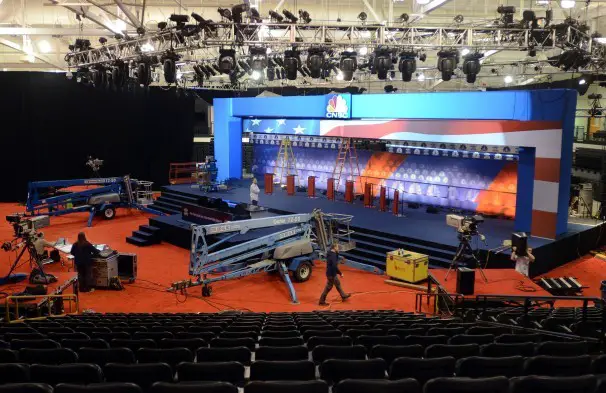The third Republican debate, hosted by CNBC, is coming up on October 28. Following the first two GOP debates, which saw a split into two broadcasts and as many as eleven candidates on one stage, the Republican National Committee is under pressure to ensure that the number of candidates will be limited to a more reasonable number.
Report from Politico:
The uncertain terms of the next Republican debate are setting off a wave of anxiety among middle and bottom tier campaigns, with several lashing out at the Republican National Committee for failing to provide clarity on how many candidates will appear on stage.
The campaigns fear the entry criteria for the Oct. 28 debate are being designed to reduce the number of candidates on stage for the third primetime debate — a life-or-death matter for White House hopefuls on the bubble.
While the RNC doesn’t set the rules, it does have a voice in working with the networks running the debates. The committee has not said how many candidates will be allowed into the primetime debate, which will be held in Boulder, Colorado, and broadcast on CNBC. Nor are there any indications there will be an undercard event, as there have been in the first two debate showdowns of the primary season.
“With the next debate a month away, it is maddening that the RNC has yet to provide any guidance to campaigns regarding the criteria that they and CNBC plan to use to exclude candidates,” said Curt Anderson, an adviser to Louisiana Gov. Bobby Jindal, who appeared in both undercards. In the spin room after CNN recent debate, Jindal spokesperson Gail Gitcho said they already had plans to speak with CNBC in order to keep Jindal on the stage.
A senior adviser to another Republican candidate also expressed suspicion that the party was looking to winnow the field of candidates. “Insiders in Washington want to limit the debates because they want their two favorites, Bush and Rubio, to take on Donald Trump,” the adviser said. “They’re whispering in [RNC Chairman] Reince Priebus’s ear that, ‘The stage is too big, make it smaller.’” [Emphasis added]
The radio silence extends beyond the entry criteria to other aspects of the debate — such as who the moderators will be, and how long the duration will be.
“Campaigns simply want to know — what’s the criteria, and what’s the format.” said Chris LaCivita, an adviser to Rand Paul.
The candidates have a valid point that the decision making process of who makes up the rules to include or exclude candidates is murky and opaque. For the first two events, Fox News and CNN came up with their own rules, the latter of which were bent to include Carly Fiorina in the second debate under a special addendum.
As a result, candidates such as Louisiana Governor Bobby Jindal are now inquiring about the next event given that two candidates have dropped out meaning if existing rules are in place, there could be a different list of the top ten candidates on stage come October 28.
At some point, the field will narrow, and Scott Walker’s departure was the first major exit of the race. Rumors that Rand Paul may be following would surely shake up the debate lineup but, at this point, we don’t know if CNBC is following the same “top ten” candidate rules as were used by Fox News and CNN.
I’m assuming we may get some answers later this week or into next week about the criteria CNBC will use when extending invitations to candidates.
Update
A little more on this from Mediaite:
The previous two debates featured ten and eleven candidates, but moderator Chuck Todd hinted in an interview with ESPN that he plans to limit the number of podiums. “Let’s just say the goal is to create a threshold that candidates have to meet to qualify for the stage rather than committing to putting 10 candidates on the stage. And I don’t think we should commit to more than 10-candidate debates. You have to be viable.”
Todd went on to give some hypothetical debate standards that could size down the number of spots, including limiting the debate to those who earned at least 5% in New Hampshire or Iowa. Under that standard, candidates like Rand Paul, Mike Huckabee, Chris Christie who made it into previous debates would not qualify without a bump in their poll numbers. [Emphasis added]
There are also currently no plans to introduce an earlier second-tier debate to accommodate candidates who could not make the primetime debate. “I doubt there will be an undercard,” RNC spokesman Sean Spicer said on CNN the day after the second debate.
That is a glimpse into what we may be seeing for this debate. The undercard debate has worn thin and it’s time to pull the plug on that. However, a five percent threshold would certainly create a smaller number of candidates and would be sure to ruffle some feathers. Stay tuned.
Donate Now to Support Election Central
- Help defend independent journalism
- Directly support this website and our efforts
